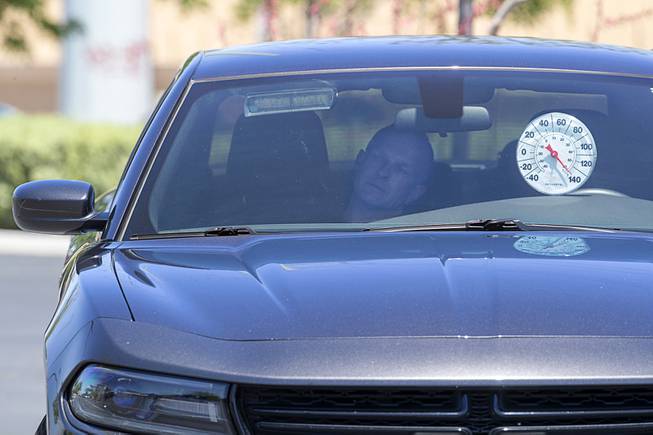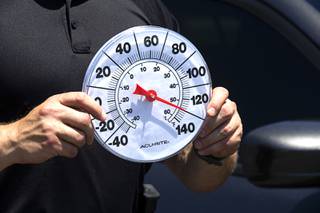
Metro Police Officer Larry Hadfield waits in a car with the windows up and the engine off during a news conference at Metro Police headquarters Thursday, May 13, 2021. The temperature in the car went from 85 degrees Fahrenheit to over 130 degrees in about 10 minutes.
Thursday, May 13, 2021 | 8:30 p.m.
To spotlight the perils of leaving a child inside a hot car, a Metro Police spokesman climbed into one to show how quickly the interior can heat to deadly temperatures.
In less than 10 minutes, the wall-clock-sized thermometer on the windshield went from 88 degrees to more than 130 degrees.
With beads of sweat covering his forehead, Officer Larry Hadfield gave a thumbs-up and exited, ending the demonstration outside Metro headquarters.
“It was hot in there, guys,” he told reporters. “To be honest with you, it heated up a lot quicker than I thought.
“Had I been in there another 10 minutes, I have to tell you that I would have struggled,” he said. “Actually, I began to struggle.”
Hadfield then hopped in a Las Vegas Fire & Rescue ambulance where paramedics checked him out.
Lt. Dave Valenta said the message was “very important to share,” particularly when everybody is out running errands — “everybody is always in a rush.”
So leaving a child in a hot car, even if only while the caregiver is running into a store, can quickly become a death sentence.
“That’s when the trouble begins,” said Valenta, noting that 53 children died in the U.S. each year in 2018 and 2019, a record, according to the National Highway Traffic Safety Administration.
In 2020, a pandemic year in which many Americans stayed off the roads, 24 children died, including one in Las Vegas.
Sayah, 1, was dead when Metro officers busted the window of her father’s car Oct. 5 near Owens Avenue and Martin Luther King Boulevard.
Her father, Sidney Deal, had flagged down officers that afternoon for help but didn't want them to break a window because of the expense, police said at the time.
Deal is out on house arrest and his case on a felony count of child abuse and neglect with substantial bodily harm is still moving through Las Vegas Justice Court.
Sayah was trapped in the car for about an hour, police said.
“Weather is heating up, with the hottest months are still ahead of us,” Valenta said.
The temperature near Metro headquarters at the time the demonstration took place was recorded at 98 degrees, the National Weather Service said, but it’s not unusual for the valley to see temperatures exceed 110 degrees over the summer.
Child deaths in hot cars are unusual in Las Vegas, Valenta said, although Tim Szymanski, spokesman for Las Vegas Fire & Rescue, said that dispatchers take on average 300 to 350 calls in Clark County each year for children and pets locked inside cars.
Overwhelmingly, he said, the calls, about 95% of them, are from people who accidentally lock children and pets in running cars.
Valenta said that civilians who encounter a situation should check to see if the child appears OK. If so, he said, they can consider trying to find the caregiver, particularly if the car is parked outside a business, where clerks could make an announcement over an intercom system.
However, if the child appears in danger, they should call 911 immediately, he said.
In that scenario, citizens can also “do what you can to try to access the vehicle,” including breaking a window, Valenta said. If that occurs, the person should stick around to give a police statement.
Szymanski said that firefighters, who are also paramedics, respond immediately and are equipped to handle the situation. A locksmith is dispatched at the same time and the knowledgeable first responders weigh the option of waiting to enter the car without causing property damage.
In either case, citizens should trust that paramedics will make the right call of whether to wait, Szymanski said, adding that it's not rare when they encounter desperate caregivers who want the windows to be broken immediately.
A child’s body heats up three to five times faster than that of grown people, Valenta said, especially if they’re restrained in a seat.
“I'm an adult,” Officer Hadfield said seconds after he got out of the car. “Adults aren’t as susceptible to heat injuries.
“It’s so very important this next summer and as we are into the spring that you do not leave your kids in your car,” Hadfield said.

